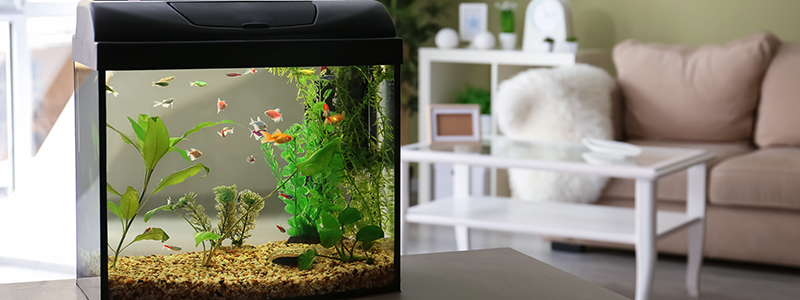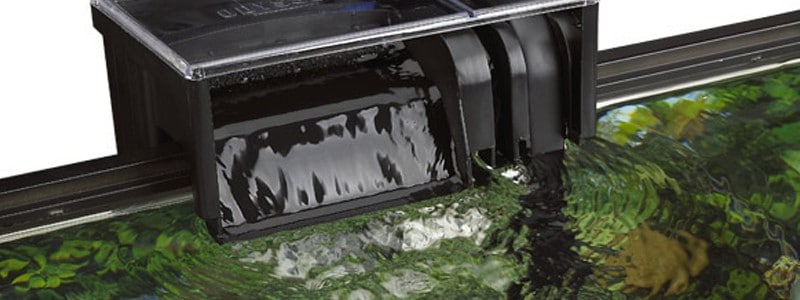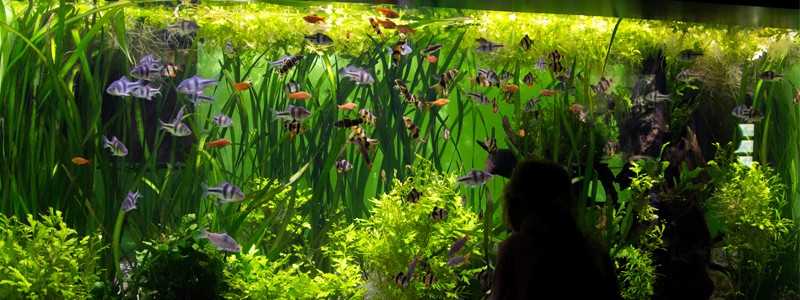Aquarium filters keep fish tanks clean and even create the peaceful sound of flowing water For some, this sound aids in a good night of rest while others lay awake at night to the sound of the flowing filter. If you are one of these restless fishkeepers you may consider turning off the aquarium filter at night, but should you?
A filter is a necessary component in keeping an aquarium safe for fish. Turning the filter off each night could lead to bacteria build-up or a chemical imbalance. To protect fish from the harmful effect of these issues, keep the aquarium filter running.
If your aquarium filter is preventing you from getting a good night’s sleep or is running up an electric bill, all is not lost. Another option is to have a filterless tank. Learn more about the purpose of your aquarium filter and quieter, filterless tanks below.
Why You Should Not Turn off the Filter
Aquarium filters serve many roles in your fish tank and are an essential piece of keeping your fish happy and healthy.
As the name suggests, an aquarium filter is responsible for filtering unwanted substances out of water. This may include fish waste, leftover food, harmful chemicals, or other dust and debris that finds its way into the tank.
Fish are not accustomed to living in the highly chlorinated water that runs through many of the taps in our homes. Because of this, we add things such as water conditioners and filtration systems to make the water more inhabitable for the fish.
Without a filter running in your aquarium, quantities of ammonia and nitrogen could rise to dangerous levels, killing your fish.
Another benefit of filtration systems is tank aeration, also known as circulation.
Fish breathe in a way extremely different from you and me; however, fish still require oxygen for survival. Rather than just breathing in air, fish filter oxygen out of the water through their gills.
If the water has too little oxygen, the fish will not be able to survive. Aquarium filters give the water a bit of a current therefore increasing the oxygen levels in the tank and giving fish something to breathe.
Alternative Solutions to Turning off Filter
As you can see, filters are really important in keeping your fish in a healthy state. While it’s important for them to be safe, it’s also important to us that you are staying healthy as well.
We have some problem-solving suggestions to use besides turning off the filter.
Relocate Tank
If the sound from the filter on your fish tank keeps you awake at night, consider moving it into a different room or sleeping with earplugs. These are simple solutions that allow you to rest comfortably while your fish can breathe healthily.
There are some other options out there if you are looking for a different solution. If you want to keep your tank where it is or if it’s too big to move, consider the following.
Quieter Filters
Because filtration systems also act as aerators, there will almost always be noise coming from your filter. If there is no space anywhere else for your fish tank there are a few quieter options to choose from.
AA Aquarium Green Killing Machine
This first option is potentially the closest to silent you will ever get to your fish tank.
The Green Killing Machine operates using UV light rather than the typical running water through a sponge to filter out waste and chemicals. Although this UV filter does not have the sound of trickling water, it also does not double as an aerator.
Because oxygen is a necessity, you will need to add a tank aerator too. This unit will produce noise, but not as much as a traditional filter.
Aqueon Quietflow E Internal Power Filter
The Quietflow filter is a traditional filtration system that has the added bonus of aerating the tank.
As the name says, this filter is designed with low flow technology to keep the tank clean, but the noise down. Many user reviews claim that the system is entirely silent!
This quiet power is achieved by containing the motor inside a thick canister. This helps minimize the whirring noise produced by so many other aquarium filters.
Although this filter is named for being quiet, Aqueon does warn the system may become louder at times. If this happens, simply adjust the impeller until the noise subsides.
Tetra Whisper EX Silent Multi-Stage Power Filter
This filter is the ideal option for all fishkeepers alike. The filter runs quietly while also providing for optimal oxygenation and easier filter changes.
The Tetra Whisper operates quietly by filtering and returning the water directly to the surface.
Not only is this filter quiet, but it is also one of the most affordable filtration systems available.
Filterless Aquariums
If even the quietest of filters still leaves you wanting to unplug it at night, then perhaps a filterless aquarium is the right choice for you.
In order to have a filterless aquarium, you will need to find two alternative systems for filtration and aeration.
Some fish survive by eating algae and the waste from other fish. Species such as shrimp and snails break down the fish waste helping clean the water. Add a few of these to your tank to serve as a filtration system.
Next, you need aeration in order for your fish to breathe. Luckily, the simple solution to this is aquatic plants!
Just like plants on land, aquatic plants break down CO2 and produce oxygen. A few aquatic plants should be able to produce enough oxygen to replace an electric aerator.
Not only do aquatic plants increase the oxygen levels in your tank, but they also provide your fish with a natural snack and beautiful aquarium decor.
Watch this video to learn more about building a filterless aquarium for your fish!
Changing your aquarium to be filterless may lead to water changes more often. Be sure to test your water frequently and to watch for spikes in ammonia or nitrogen.
The transfer from the filter to filterless should take place over an extended period of time. Making the change all at once could shock your fish leading to issues such as swim bladder disease.
Although many fish can survive in a tank without a filter, some fish will not be able to survive without the additional help from an electric filtration system. While only some fish need the filter to survive, most need the filter in order to extend their life and thrive.




